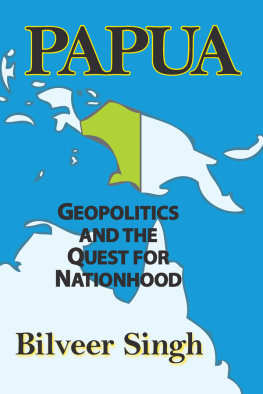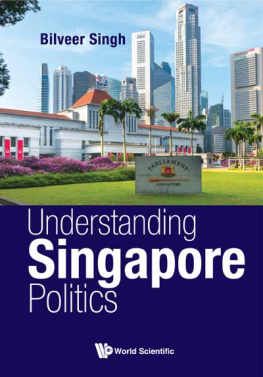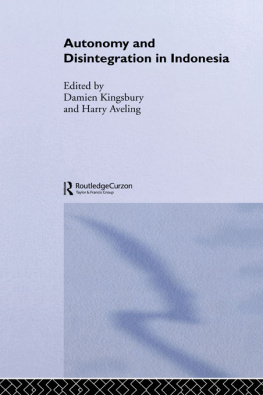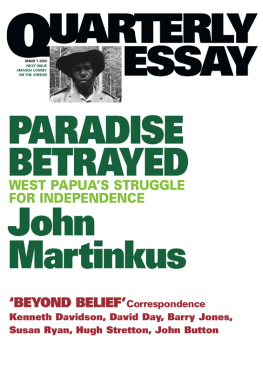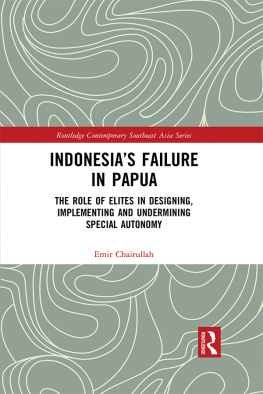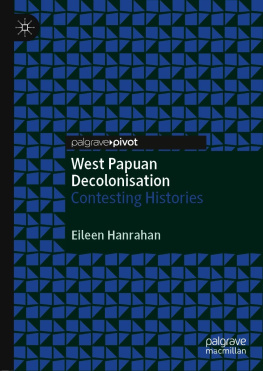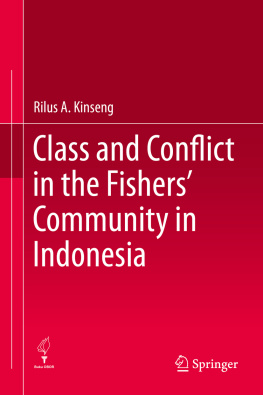First published 2008 by Transaction Publishers
Published 2017 by Routledge
2 Park Square, Milton Park, Abingdon, Oxon OX14 4RN
711 Third Avenue, New York, NY 10017, USA
Routledge is an imprint of the Taylor & Francis Group, an informa business
Copyright 2008 by Taylor & Francis.
All rights reserved. No part of this book may be reprinted or reproduced or utilised in any form or by any electronic, mechanical, or other means, now known or hereafter invented, including photocopying and recording, or in any information storage or retrieval system, without permission in writing from the publishers.
Notice:
Product or corporate names may be trademarks or registered trademarks, and are used only for identification and explanation without intent to infringe.
Library of Congress Catalog Number: 2007045405
Library of Congress Cataloging-in-Publication Data
Singh, Bilveer, 1956
Papua : geopolitics and the quest for nationhood / Bilveer Singh.
p. cm.
Includes bibliographical references and index.
ISBN 978-1-4128-0705-0 (hardcover : alk. paper)
1. Nationalism--Papua New Guinea. 2. Geopolitics--Papua New Guinea.
3. Papua New Guinea--Politics and government. I. Title.
DU740.75.S58 2008
995.103--dc22
2007045405
ISBN 13: 978-1-4128-0705-0 (hbk)
To Gurdial Kaur my beloved wife who has been the pillar of strength and inspiration in my life without whom this study would not have been possible.
There has long been a struggle over Papua; between the colonial powers (British, Germans and the Dutch) in the eighteenth and nineteenth centuries, between the Dutch and Indonesians, from August 1945 to August 1962, and between Indonesia and Australia from 1950 to 1962. Yet, the single most important struggle over Papua since the territory was formally handed over to Indonesia has been the attempt by armed and unarmed separatists to pursue what has been described as a struggle for self-determination. A range of arguments and justifications have been put forth to claim that Papua, namely, the western half of the island of New Guinea (presently shared between Indonesia and Papua New Guinea), deserves to become a sovereign and independent state, if need be, along the lines of East Timor. If East Timor, once the twenty-seventh province of Indonesia, can achieve statehood, so should Papua, argue the separatists. Yet, for the time being, Papuan nationalism and its quest for self-determination, on the one hand, and Indonesian nationalism and geopolitical interests of the various stakeholders, on the other, seem to be in conflict. This has exacerbated the struggle in the territory, which has been described as the last of the major sources of instability in Indonesia following the peace deal over Aceh in 2005.
While there have been few cases of successful secession, as evident in East Timor and Bangladesh, more often than not, attempts by secessionists are met with ruthless repression by the state, especially the armed forces, who view themselves as the guardians of the modern state in most of the decolonized areas of Asia and Africa. While cases of successful secession are very few, there are litany of attempts to do so in South, Southwest and Southeast Asia that had ended in failure, and often at great cost to all parties concerned. While the West has championed self-determination causes in general, on the whole, states tend to be status quo-oriented with violations of territorial sovereignty and integrity regarded as taboos that should be avoided at all costs, even if it means condoning repression of would-be secessionists. India, Pakistan, Myanmar, Philippines, Thailand, and Indonesia, the list of states guilty of such seems endless.
Ever since the Dutch refusal to surrender the then-West New Guinea to Indonesia in the late 1940s and the subsequent brinkmanship that culminated in Indonesias takeover of the territory a decade later, much has been written on the subject. The semantical description of the territory has also shifted from that of West New Guinea, West Papua, West Irian, Irian Jaya, Papua, West Irian Jaya, Central Irian Jaya, and Papua. Most writings on Papua have focused on the unjust manner by which the territory was transferred to Indonesia. Writers such as Robin Osborne, John Safford, Peter King, and Jim Elmslie have supported the claims of Papuan separatists, arguing that the West, especially the United States had betrayed the Papuans for its own geopolitical interests. Despite the United Nations endorsement, the transfer was illegal due to the manner by which the Act of Free Choice (the referendum deciding on Papuan self-determination) was administered. While such an argument has been debated and there is no doubt that there were problems with the manner Indonesia determined the self-determination process, it does not logically follow that Papua is not an integral part of Indonesia.
Many writings have also focused on the manner Indonesia has ruled the province since May 1963, when it took over the territory from the United Nations Temporary Executive Administration (UNTEA) and more specifically since 1969, following the Act of Free Choice. The main criticisms have been of the ways Papua has been transformed into an internal colony where the indigenous culture and traditions are undermined, the people impoverished, the territorys rich resources voraciously exploited, the environment degraded, and the people politically repressed and marginalized. Transmigration is making the Papuans a minority in their own homeland and, worst of all, human rights abuses and violations are extensively perpetrated by the security apparatus. There is much truth in these allegations as evident from the murder of many Papuan leaders such as Arnold Ap, Tom Wanggai and Theys Eluay. More than 100,000 other Papuans are also alleged to have been killed under Indonesian rule.
Granted that Papua has tremendous geopolitical and geoeconomic significance and that there are many problems associated with the territory, what has been somewhat neglected has been the security dimension of the unsettled conflict. It is interesting to note that what initially placed Papua on the world map was not its riches, but its security and strategic significance. Whereas the Dutch had fought hard to hold on to Papua for political, nostalgic, and psychological reasons, the Indonesians were prepared to go to war, mainly for defense and security reasons, as they believed in the territorial integrity of their state that was previously under Dutch colonialism. From the late 1940s to early 1960s, the Australians also supported the Dutch position to deny Papua to Indonesia on security grounds. Canberra hoped to create a security corridor between an unstable and dangerous Indonesia and itself through the buffer of Papua as well as to avoid sharing a land border with Indonesia in its colony, Papua New Guinea. Later, the Americans pressured the Dutch and brought the British and the Australians into line to support Washingtons position to back Indonesias ownership of Papua, again principally on grounds of security, to prevent Indonesia from joining the Soviet camp and to deny Moscow a beachhead in Indonesia in the midst of the Cold War. Since then, the Western world, Southeast Asian countries, and even outwardly, Australia, have supported Indonesias hold of Papua, mainly due to security considerationsa Balkanized Indonesia will be worse for everyones interests. Thus, the security factor has been uppermost in the calculus of most players as far as Papua is concerned and this dimension has almost single-handedly determined Papuas fate thus far. Undoubtedly, the security dimension will similarly influence its future.

